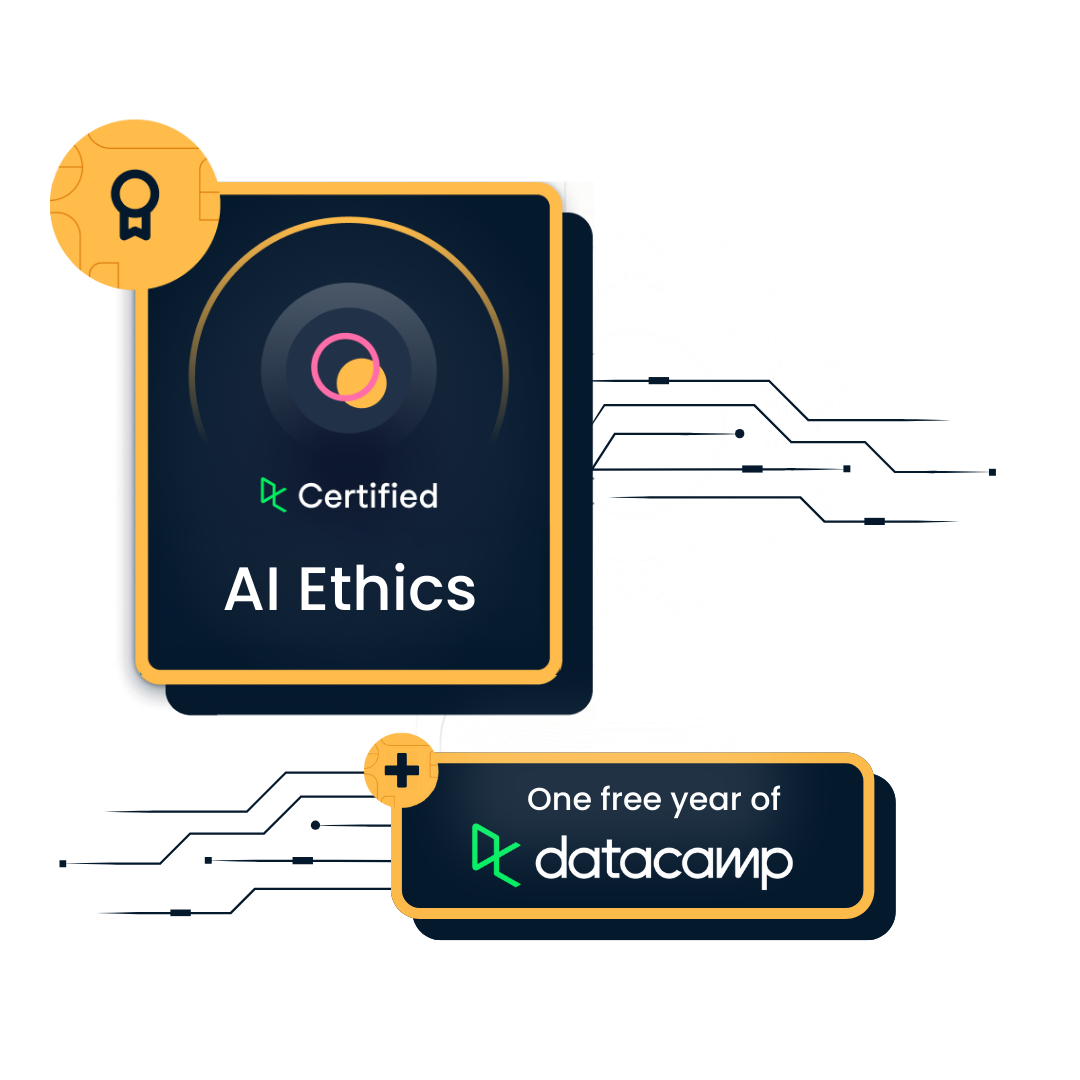In-person Training
DataCamp Masterclass AI Ethics
Join DataCamp for a full-day workshop that will equip you with the key tools and knowledge to integrate ethical AI practices into your organization’s strategy, promoting responsible and fair AI deployment.
- Ocotber 24, 2024
- 9:00 AM – 5:00 PM
- Shoreditch, London
- Full day of AI Ethics training

Earn an Industry-Recognized Certification
At the end of your session, you'll receive an industry-recognized AI Ethics certification, endorsed by leading experts, along with one year of free access to DataCamp.
- Enhance your professional credibility
- Expand your career opportunities
- Stay ahead of industry trends

Key Details
Gain a clear understanding of AI ethics and strategies to address data bias, while building an ethical framework with best practices in governance and responsible AI deployment.
- Understand AI ethics fundamentals, including fairness and transparency.
- Explore strategies to identify and mitigate AI biases.
- Gain tools for ethical decision-making and responsible AI use.
- Learn to establish an AI governance framework for long-term success.

Agenda
Foundations of AI Ethics
In this session, participants will explore key ethical principles such as fairness, accountability, and transparency. They’ll learn how to identify ethical risks, understand when ethical considerations are critical, and discuss strategies for deploying AI responsibly to build trust and prevent harm.
Learning Objectives
- Definition and significance of AI ethics.
- Key principles: fairness, transparency, accountability, and privacy.
- Group discussion on ethical dilemmas in AI development.
- Case studies on ethical issues in AI deployment.
- Discussion on balancing innovation and ethical considerations.
Understanding and Identifying AI Bias
This session will clarify how biases in AI arise—detailing their sources, types, and consequences. It will address common misconceptions about bias in AI systems and highlight real-world examples to demonstrate the effects of biased data on outcomes. Attendees will gain practical knowledge to detect and mitigate bias, ensuring more equitable and fair AI applications.
Learning Objectives
- Definition and importance of data bias.
- The meaning of fairness in data analysis.
- Selection bias, measurement bias, response bias, design bias, and societal bias.
- How bias occurs at different stages of data analysis.
- Consequences of biased data on decision-making.
- Case studies on the impact of data bias on systemic inequalities.
- Group discussion on real-world examples of data bias.
Detecting and Mitigating Data Bias
Learn how to effectively identify and address data bias using a structured approach that ensures fairness and accuracy. The session will cover best practices for detecting bias, mitigating its effects, and ensuring compliance with ethical standards. Participants will also explore strategies for refining data processes to minimize bias and enhance decision-making quality.
Learning Objectives
- Hands-on techniques to identify biases in data sets.
- Strategies such as random sampling, anonymization, and diversity in data sources.
- Handling missing data, outliers, feature associations, and sensitive data proxies.
- Effective communication strategies for stakeholders.
- Role-playing scenarios to practice communicating bias mitigation.
Implementing Ongoing Ethical Practices
Closing the day, participants will explore strategies to embed ethical considerations throughout the lifecycle of AI projects. They’ll learn how to assess their current practices, identify potential ethical risks, and implement practical steps to ensure ongoing compliance with ethical standards, fostering responsible AI development and deployment.
Learning Objectives
- Ethical and legal considerations, overview of frameworks and privacy concerns.
- Trade-offs in ensuring fairness and transparency.
- Mechanisms to ensure compliance with ethical standards and regulations.
- Best practices for AI governance.
- Keeping up with regulatory and legislative changes.
- Preparing for future developments in AI ethics and governance.

Session Leader
Caryn Tan
Learning Solutions Architect at DataCamp